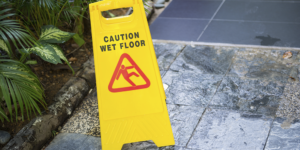
slip, trip, fall,slip and fall case, property, case, fall accident cases, settle, trial, court, injuries
Settlement Negotiations
Some slip and fall cases settle out of court long before a trial occurs, while other cases settle just days before the trial happens.
Property owners recognize that settling a slip and fall case out of court will require less money and time than going through an uncertain trial process. While many fall accident cases settle before going to court, every slip, trip, and fall case is different, and results will be based on the details of the accident.
Types of Slip and Fall Cases
Slip and fall accidents happen in a variety of locations under hazardous and unmaintained conditions. Some falls happen due to wet floors, icy walkways, uneven walkways, dimly lit areas, and damaged or unmaintained parking lots, sidewalks, ramps, floors, and stairs. Fall accidents as a result of these conditions cause many different types of injuries. The five most common types of slip and fall injuries:
- Soft Tissue Injuries
- Head, Neck, and Brain Injuries
- Spinal Cord Injuries
- Lacerations and Bruises
- Broken Bones
Types of Visitors
Property owners have a duty of responsibility to their visitors. There are three different types of property visitors, invitees, licensees, and trespasser.
- Invitee – Someone who is lead onto a premise for any lawful purpose, by express or implied invitation, by a premises owner or occupier.
- Licensee – Someone allowed on a premise for the benefit of the visitor, not at the benefit of the owner or occupier.
- Trespasser – Someone with no permission to be on the premises.
The 3 Things To Prove A Slip and Fall Injury Claim
To win a slip and fall injury case, you need to prove three things:
- Liability. The premises owner or occupier was negligent in performing their duty of care.
- Negligence. The premises owner or occupier breached their duty of care, and the visitor was harmed.
- Responsibility and Fault. The breach of duty or negligence of the premise owner or occupier caused visitors injuries.
The most crucial factor for a slip and fall victim will be to prove a property owner was negligent by failing to inform or remove a potentially dangerous condition that caused injuries per Florida Statute § 768.0755.
Settling A Slip and Fall Case
While each slip and fall case is different, the time to settle will be based on the strength of the evidence to support injuries sustained in the fall accident. Determining the length of negotiations can be challenging and will ultimately be up to the insurance company to offer a fair and appropriate settlement.
Settlement Through Mediation
Mediation is a process where both parties discuss their disputes with the assistance of a trained, impartial third party called a mediator in an effort to reach a settlement. Both parties have opportunities to address the issues, interests, and information surrounding a slip and fall incident, and explore ideas for a resolution to the dispute.
The primary role of a mediator in a slip and fall case is to encourage each side to air disputes, describe case arguments, set expectations, and bring both parties to an agreed-upon satisfactory solution.
Before Accepting a Settlement Claim
Settlement agreements are final and include a release of liability. This means that the insurance company won’t be held responsible for payments that don’t fall within the settlement agreement.
Once you’ve accepted a settlement offer, you can’t go back and ask for more compensation for any losses that you suffer in the future due to your injury and won’t be allowed to take your case to trial.

Your Injuries Could Be More Serious Than Initially Thought
You need to understand the value of your claim before accepting a settlement offer. You may not be aware of the full extent of your injuries long after the accident due to the following reasons:
- Secondary infections can occur
- The bruises don’t heal as the doctors had expected
- Your injuries may require a more extensive treatment than you had anticipated
You also need to determine how your injuries may affect your current and future job opportunities, overall health, and quality of life. You’ll only have some form of certainty regarding these factors after you’ve achieved MMI (maximum medical improvement).
Victims Can Receive Compensation if They Reject a Settlement Offer
Insurance adjusters usually have only one goal: to resolve the case with the lowest settlement they can offer. They may imply that if you reject a settlement offer, in the beginning, you may not receive any compensation later on, but this isn’t the case at all.
As an accident victim, you can reject the settlement offer or make a counteroffer to the insurance company, but you’ll need to understand the value of your case first and be willing to take it to court.
Bottom Line
Instead of letting the insurance company take advantage of your inexperience with personal injury cases, you need to get in touch with a qualified attorney to understand your claim’s full value and receive fair compensation for your losses. If you have a slip and fall case you would like to discuss with a slip and fall attorney contact us today.